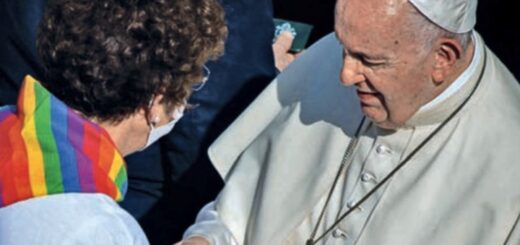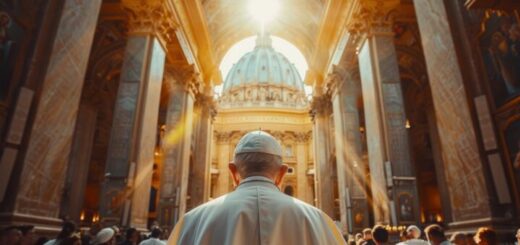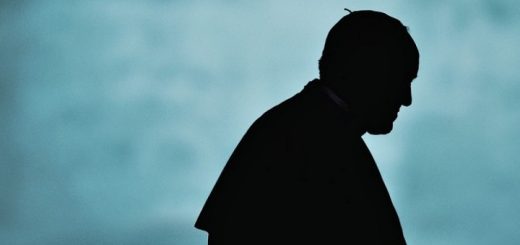I am a gay priest. There is more than the excuses after the offensive words of Pope Francis
Article by Bryan N. Massingale* Published on the website of the Catholic magazine America. The Jesuit Review (United States) On May 29, 2024, freely translated by Luigi and Valeria de Jonathan's tent
They are a priest who publicly declared that they belong to the LGBTQ community. As gay, I was shocked and embittered to learn that the Holy Father used an offensive term during a meeting with the Italian bishops.
While apparently justified the choice not to admit gay men in the seminars, the Pope would have said that there was too much "froculinous" in the seminars. We try to clarify the insult that has been used, in order to also understand the disputes that derived from it. This is an offensive term, often used in a worse/derogatory way to refer to gay men, quite vulgar that it is not translated here.
In response, the Vatican said that the Pope was aware of the dissemination of this information and, although not explicitly confirming that the Pontiff used the word offensive, said: "The Pope never intended to offend or express himself in homophobic terms, and apologizes to those who felt offended by the use of a term, as reported by others".
I welcome the apologies of the Pope. He gives me relief that he did not intend to offend anyone. But any impartial observer will agree that this accident has seriously compromised his historical opening to members of the LGBTQ community.
To understand the scope of the use of the pope's insult, we must make a distinction between the intent and the impact of his words. Some try to minimize the incident as if it were only an unhappy choice of words or the unwary use of a colloquial language.
Others believe that it is nothing more than the incorrect understanding of a term by an elderly man who does not master a language that is not his mother tongue. On the other hand, there are those who underline that the Pope speaks Italian since childhood.
All this can be true. But regardless of the intentions of the speaker, this language is dehumanizing. Too often the insults and offensive epithets are underestimated by those who are not their target. But be careful not to underestimate the question: the derister insults inhumanize the "sexual minorities". Question our humanity.
In addition, the damage goes beyond those who have been directly offended by the Pope's homophobic insult. The use of this language by the Pope offers support to those institutional political choices that endanger the life of "sexual minorities" all over the world. Those who try to exclude gay, lesbian and transgender people from social life and legal protection can feel shameless and encouraged by the words of the Holy Father - and they will certainly do it.
Yes, I know that Pope Francis asked for the decriminalization of homosexuality. However, the use of an offensive terminology can only weaken its message that everyone has an "infinite dignity" which should be respected by everyone. Something is needed more than excuses.
Other questions and issues
The apologies of the Pope, although welcome and necessary, raise other questions and concerns. First, these observations would have been made in the context of a discussion on the admission to the seminary of openly gay men. Some say that the position of Francesco's clear closure on the matter was simply a reconfirmation of the official policy of the Church, clarified by the Vatican in 2005 and reaffirmed in 2016.
However, this choice of the Vatican does not take into account reality, namely that there are, and there have always been, many gay priests and gay bishops that serve the Church with generosity and loyalty. Refusing to admit homosexuals to the seminary means believing that they have intrinsic moral defects or irregularities that heterosexual men do not have. The position of the church hierarchy on this theme starts from the assumption that in gay men there is a level of sinfulness or moral deviance that is not in straight men and that would automatically make gay men not suitable for the priesthood.
But, with my experience of over forty years of priesthood, I can say that this is not true. People of every sexual orientation live celibacy in a serene way. On the other hand, there are priests of all the sexual guidelines that sometimes live celibacy with difficulty.
Sometimes these inner conflicts give rise to scandals, both by the gay and straight clergy. And the "closed cricche and gossip" - which, according to some, are the true concern that is hidden behind the use of the offensive word by Francesco - are not an exclusive of gay men. And, in any case, a generalized ban on admitting all homosexuals in the seminars is not an adequate solution to this problem.
Sexual orientation is not the decisive element for the quality of the ordered ministry, nor should it be the only reason to exclude men from seminars or religious life.
The deepest question
If it is known that there are many men with homosexual orientation that serve the Church responsible in a responsible way as ministers ordered, then what is the real problem? I believe that the controversy on the Pope's use of a dehumanizing insult and the refusal to admit to the openly gay people, refer to the deepest question that the Church has to face: gay, lesbian, bisexual, transgender and queer people are fully entitled to the body of Christ? The Vespaio raised by Francesco's observations betrays the obvious response: not yet.
Francesco usually says that "everyone" are welcome to the Church, that the embrace of the Church extends to everyone. "Todos, Todos, Todos»He exclaimed to the World Youth Day. But his Vatican words and rules about admission to seminars make it clear that everyone can be welcome, but not in the same way. Or they are welcome only on condition that there is something wrong with them, even if they fully live celibacy, and that they live without publicly recognizing their sexual orientation, if they are ordered priests.
This pays attention to another question that underlies the observation of the Pope: how welcoming the Church can be really welcoming if it officially describes the non -heterosexual orientation as "objectively disordered", a term that focuses on the moral implications of sexual acts rather than on the knowledge and acceptance of one's identity of those who describe?
If you really believe that the LGBTQ sexual orientation is "something less", then the use of insults, offenses and other forms of inhumanization cannot surprise.
Where will we end up?
During an interview on this theme, a journalist of the BBC He asked me a personal question: «As gay priest, he feels in difficulty for the way his highest superior talks about her? And what should the Pope do to recover credibility after the damage caused by his statements? ».
I replied that I don't know any LGBTQ Catholic that has not fought and not lots for its location in the church. And that I felt shocked, even a little betrayed, by the fact that a Pope spoke in this way of people like me, even if we accept that he did not intend to speak with malice. To understand the scope of what has happened, I repeat, we must recognize that the intent and impact of his words are two different things.
However, I also believe that all this is part of the labor of childbirth of a new opening in the Church. In all Christian confessions that now show a greater opening and acceptance of LGBTQ people, initially there have been closing attitudes against gay priests. In these churches of other Christian confessions, the ministers who were not heterosexuals found themselves operating in a climate that considered them morally abnormal and psychologically not fully mature. They have often been suspected of abuse, even removed from the ministry.
However, it was precisely because these priests continued to provide their service in their churches and because LGBTQ believers continued to feel part of the Church despite the official opposition they had to face, that their communities of faith have come to a more correct understanding of sexual orientation and a clearer and deeper vision of the direction in which the spirit blows within the Church.
In other words, what gives me a little comfort is that the Catholic Church is going through the same difficulties that the episcopal, the Lutherans, the methodists, the presbyterians and other religious confessions of Christian faith have faced when they confronted each other with a more updated and profound vision of human sexuality.
I comfort the fact that these tests are part of the process of change, which is sometimes a source of sadness and confusion, but it is necessary. What we are experiencing are the pains of childbirth that occur when we try to become more faithful to the Spirit of God.
What should the Pope do, in my opinion? I believe that the Pope must listen to the gay priests directly and with an open heart who faithfully serve the people of God. He must accompany us and hear the smell of this flock that is his and the Lord. It is necessary and important that he feels our joys and evidence, that he is witness to our deepest suffering and gratifications. It is necessary that it is inspired by us and our loyalty, sometimes heroic. And we need to be inspired by him, to listen to his vision, who is that of a person who dedicates himself to serving the people of God.
An example of this type, of the Synod and Spiritual Listening to deep, would do more to heal the church of the apologies of a papal press release. Listening to our voices would be an important step to become a church in which everyone, Todos They are really welcome.
* Bryan N. Massingale He is a professor of theological and social ethics at Fordham University in New York. He is the author of Racial Justice and the Catholic Church (Orbis, 2010).
Original text: I am a gay priest. We need more Than An Apology for Pope Francis' Homophobic Slur






